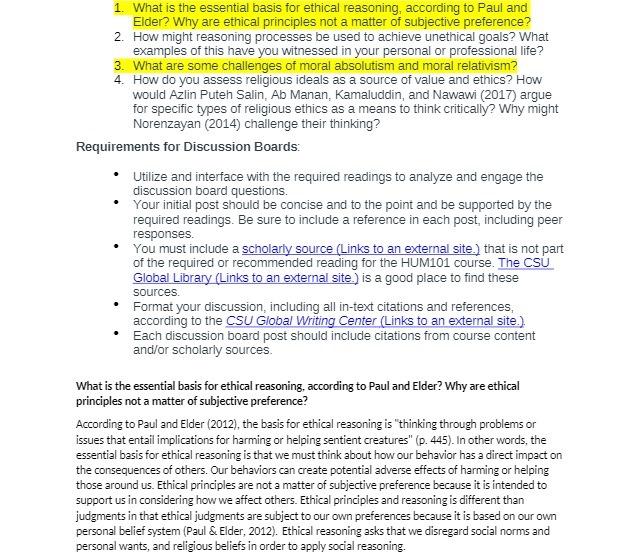Answered step by step
Verified Expert Solution
Question
1 Approved Answer
1. What is the essential basis for ethical reasoning, according to Paul and Elder? Why are ethical principles not a matter of subjective preference?

1. What is the essential basis for ethical reasoning, according to Paul and Elder? Why are ethical principles not a matter of subjective preference? 2. How might reasoning processes be used to achieve unethical goals? What examples of this have you witnessed in your personal or professional life? 3. What are some challenges of moral absolutism and moral relativism? 4. How do you assess religious ideals as a source of value and ethics? How would Azlin Puteh Salin, Ab Manan, Kamaluddin, and Nawawi (2017) argue for specific types of religious ethics as a means to think critically? Why might Norenzayan (2014) challenge their thinking? Requirements for Discussion Boards: Utilize and interface with the required readings to analyze and engage the discussion board questions. Your initial post should be concise and to the point and be supported by the required readings. Be sure to include a reference in each post, including peer responses. You must include a scholarly source (Links to an external site.) that is not part of the required or recommended reading for the HUM101 course. The CSU Global Library (Links to an external site.) is a good place to find these sources. Format your discussion, including all in-text citations and references, according to the CSU Global Writing Center (Links to an external site.) Each discussion board post should include citations from course content and/or scholarly sources. What is the essential basis for ethical reasoning, according to Paul and Elder? Why are ethical principles not a matter of subjective preference? According to Paul and Elder (2012), the basis for ethical reasoning is "thinking through problems or issues that entail implications for harming or helping sentient creatures" (p. 445). In other words, the essential basis for ethical reasoning is that we must think about how our behavior has a direct impact on the consequences of others. Our behaviors can create potential adverse effects of harming or helping those around us. Ethical principles are not a matter of subjective preference because it is intended to support us in considering how we affect others. Ethical principles and reasoning is different than judgments in that ethical judgments are subject to our own preferences because it is based on our own personal belief system (Paul & Elder, 2012). Ethical reasoning asks that we disregard social norms and personal wants, and religious beliefs in order to apply social reasoning.
Step by Step Solution
There are 3 Steps involved in it
Step: 1
2 Reasoning processes can be used to achieve unethical goals by manipulating information distorting facts or justifying actions that harm others For e...
Get Instant Access to Expert-Tailored Solutions
See step-by-step solutions with expert insights and AI powered tools for academic success
Step: 2

Step: 3

Ace Your Homework with AI
Get the answers you need in no time with our AI-driven, step-by-step assistance
Get Started


